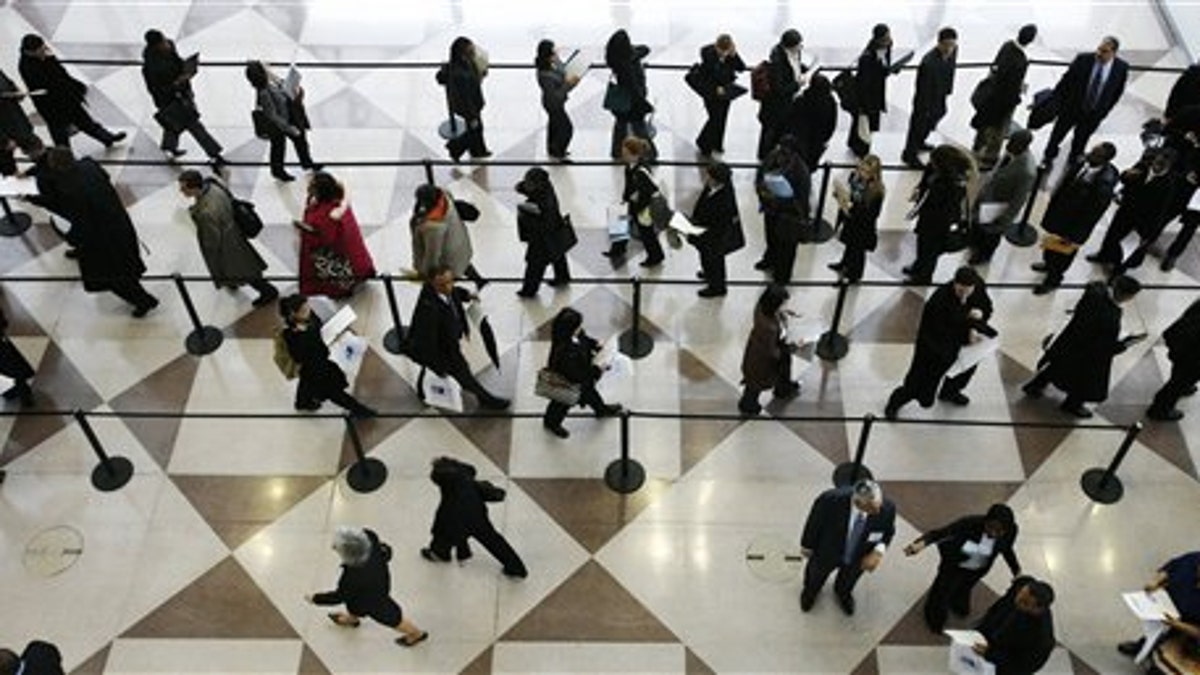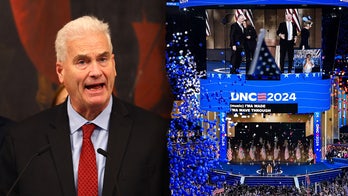
In this March 20, 2009, file photo, a line of job applicants is shown at the CUNY Big Apple Job Fair in New York. (AP)
Movement at the state level to boost the minimum wage next year could give President Obama some much-needed juice in his stalled push to raise the federal minimum and peg it once and for all to inflation.
Seven states are set to raise their minimum wage on Jan. 1 in a move estimated to benefit hundreds of thousands of workers. Despite concerns that government-mandated wages will make skittish employers even more reluctant to hire workers, supporters say the changes are not drastic enough to dent the size of the payroll, and if anything it will help the economy by putting more money in the pockets of those most likely to spend it.
Employee advocates remain hopeful on Obama's pledge to raise the federal rate by more than $2 to $9.50 an hour, though the president let that slide along with dozens of other campaign goals while he invested political capital in health care, financial regulation and stimulus over the past two years. With states pushing ahead of the federal curve on the minimum wage, it could give the president some leverage to hit the talking point next year.
"There's a growing recognition that strengthening (the minimum wage) is a key part of economic recovery," said Paul Sonn, legal co-director at the National Employment Law Project. He acknowledged the difficulty a Republican-led House could pose to a sudden minimum wage campaign but noted the precedent -- former President Bill Clinton in 1996 secured a federal wage increase despite the GOP takeover in Congress two years earlier.
"It's quite likely the president will go that direction," Sonn predicted, urging Obama to make the "macro-economic" case for a wage lift.
The seven states set for minimum wage increases next week are Arizona, Colorado, Montana, Ohio, Oregon, Vermont and Washington. Most of the changes were the result of ballot initiatives. According to Sonn's group, 17 states and the District of Columbia will soon have wages above the federal level.
The increases of between 9 and 12 cents an hour will boost wages that were either at or above the federal minimum to begin with. In every state except Oregon, the unemployment rate is at or below the 9.8 percent national average.
Sonn said that fact should help assuage concerns that a minimum wage hike would kill jobs. His organization also cited recent reports, including one last month in The Review of Economics and Statistics, that found modest wage increases do not hurt employment.
But Tad DeHaven, a budget analyst at the libertarian Cato Institute, said mandatory wage increases squeeze the economy on two levels. He argued that they slow hiring and, when done at the state level, hurt investment by making other states with lower minimum wages more appealing to prospective businesses.
"The existence of the minimum wage is already inhibitive. Increasing it would just add insult to injury," he said.
DeHaven said he'd be very surprised if Obama went after the issue next year considering the administration is trying mend ways with the business community. He said the new Republican majority in the House makes such a campaign even less likely.
"I think the business community has already taken enough beating under this administration," DeHaven said.
Obama's original campaign pledge was to boost the minimum wage from its current $7.25 to $9.50 an hour by 2011, as well as index it to inflation.
PolitiFact.com, which gauges the progress on hundreds of Obama's campaign promises, has rated this one as "stalled" -- though he has until next year to follow through.
The inflation-adjusted value of the minimum wage reached its peak in 1968. When Congress last tackled the minimum wage in 2007, after a 10-year hiatus, it was the longest the country had gone without tweaking the rate.











































